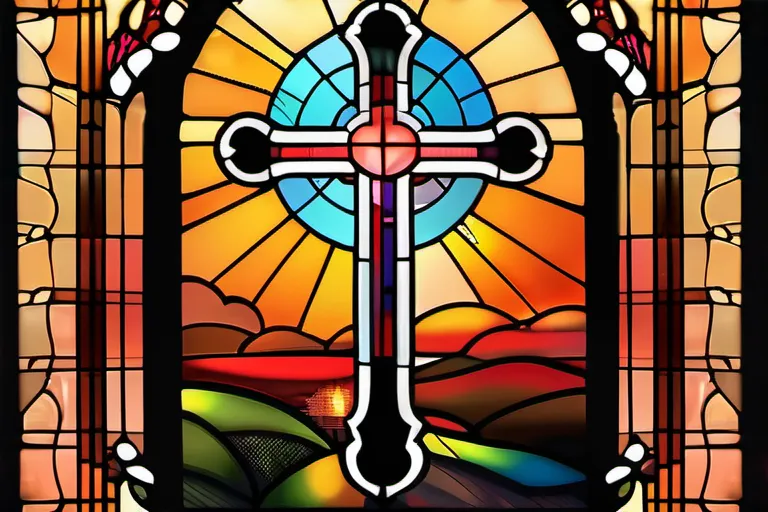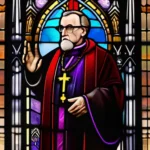Explore the origins, beliefs, and impact of Protestantism on society and religion.
Protestantism is a major branch of Christianity that emerged during the 16th century. This article provides an in-depth look at its history, beliefs, and influence on Western civilization.
The Emergence of Protestantism
Imagine the world of religion as a vast garden, where different beliefs and practices grow side by side. But in the 16th century, a new branch sprouted—Protestantism. How did this branch come to be? Let’s delve into its origins with some rhetorical questions that may spark your curiosity: What would happen if someone challenged the dominant religion of their time? Who could have dared to question centuries-old traditions and practices?
Enter Martin Luther, a German monk and theologian who sparked a revolution. His famous act of defiance came in 1517 when he nailed his Ninety-Five Theses to the door of the Wittenberg Castle church. These theses were like seeds planted into the soil of societal unrest. They challenged the Catholic Church’s practices, such as the sale of indulgences, and laid out a new path for religious freedom.
The impact was immense, almost like ripples in a pond. The Protestant Reformation quickly spread across Europe, with key figures like John Calvin and Huldrych Zwingli each contributing their own flavors to this diverse tree. They emphasized the importance of personal faith and the Bible as the ultimate authority, much like the roots that grow deep into the earth for stability.
These movements weren’t just about changing religious practices; they were about challenging the social and political structures of the time. It’s almost as if a gust of wind blew through the garden, shaking up old habits and forcing people to question their beliefs. The result was a new landscape where different branches competed for light, leading to a rich tapestry of Christian denominations.
So, how did this movement change society? It’s like comparing two gardens—one with only one type of flower and the other with a vibrant mix of colors and scents. Protestantism introduced diversity in worship, education, and community life, fostering a more individual approach to faith that continues to influence societies worldwide.
The emergence of Protestantism was not just about breaking away from the past; it was about planting seeds for the future. These seeds have grown into a vast garden, where every believer can find their own path through the varied beliefs and practices of this dynamic religion.
Core Beliefs and Practices
Protestantism, a branch that split from the Roman Catholic Church during the 16th century, has profoundly shaped both religious and societal landscapes. As we explore its core beliefs and practices, one can’t help but ponder: what makes these doctrines so distinct and influential?
The foundation of Protestantism lies in the belief in justification by faith alone, a concept that challenges the traditional Catholic emphasis on good works and sacraments. This idea, often referred to as sola fide (by faith alone), posits that an individual’s relationship with God is established solely through personal faith in Jesus Christ. It’s like a key unlocking a door; once you have faith, everything else falls into place.
Another cornerstone belief is the sola scriptura, which asserts that the Bible is the supreme authority for Christian life and doctrine. This principle encourages direct interpretation of scripture by believers, much like reading a map to navigate unfamiliar terrain. It’s this emphasis on personal interpretation that gave rise to diverse Protestant denominations, each with its own unique reading of the scriptures.
The practice of solus Christus, or salvation through Christ alone, further distinguishes Protestantism. This belief underscores the importance of individual faith in Jesus as the sole mediator between God and humanity. It’s a reminder that in a world often clouded by complexity, simplicity can be profound.
In terms of practices, Protestants advocate for regular Bible reading, prayer, and preaching. These are not just rituals but essential components of daily life, akin to brushing your teeth or eating breakfast each morning. The practice of baptism and communion (Eucharist) also holds significant importance, symbolizing the body and blood of Christ.
These beliefs and practices have had a transformative effect on society. They’ve fostered a culture of individual responsibility and personal piety, influencing everything from education to politics. It’s as if Protestantism has been a lighthouse, guiding millions towards a more direct relationship with God and each other.
In conclusion, the core beliefs and practices of Protestantism are not just theological concepts but powerful forces that continue to shape the world today. As we delve deeper into its history, it becomes clear how these ideas have become integral to our modern understanding of religion and society.
The Reformation: A Turning Point
Imagine a world where the Church’s teachings seemed more like a distant echo, lost among the cacophony of human voices. That was the Europe of the 16th century, until one man’s act of defiance sent shockwaves that still reverberate through history and society today. Martin Luther, with his famous nailing of the 95 Theses to the door of All Saints’ Church in Wittenberg, Germany, was not just challenging the Church; he was igniting a revolution.
But why did Luther’s actions spark such a profound change? It wasn’t merely about personal grievances or academic disputes. The Reformation, as this period is known, was a response to perceived corruption and abuse within the Catholic Church—selling indulgences, for example, was seen as nothing more than a cash grab.
Luther’s ideas were like seeds scattered across Europe. They flourished because they offered something that people had been craving: a direct relationship with God, without the need for intermediaries or complex rituals. His famous solus christus—“by Christ alone”—and sola scriptura—“scripture alone”—simplified faith and shifted the focus from external practices to inner belief.
The impact of the Reformation was far-reaching, transforming not only religious landscapes but also political and social structures. It’s like a domino effect; once those first stones were pushed, everything else followed suit. The Catholic Church responded with countermeasures, leading to a period of intense conflict that shaped nations and divided communities for centuries.
From this turmoil emerged new denominations, each with its own unique interpretation of Luther’s teachings. Think of it as a tree branching out in multiple directions: Lutheran, Calvinist, Anglican—each branch growing stronger through adaptation and innovation.
So, what legacy does the Reformation leave us today? It challenges us to question not just religious practices but also any institution that claims authority over our beliefs. The Protestant work ethic, born from this era, continues to influence economic policies and societal norms around the world.
The Reformation, in essence, was about reclaiming a voice—finding your own path through the forest of faith, illuminated by the light of scripture. It’s a story that reminds us that change often begins with one person daring to speak truth to power.
Protestant Denominations
As we delve into Protestant Denominations, it’s like exploring a colorful tapestry woven from diverse threads, each representing a unique branch within the Protestant family. From the sturdy Calvinism of John Calvin to the charismatic worship of Pentecostal churches, these denominations are as varied as the people who practice them.
Calvinism, with its emphasis on predestination and the sovereignty of God, has profoundly influenced not just religious beliefs but also political systems in regions like Switzerland. Is it any wonder why Calvin’s teachings continue to shape modern democratic principles?
- Lutheranism, founded by Martin Luther, has a strong presence in Germany and Scandinavia. It emphasizes justification by faith alone and the importance of Scripture.
- Anabaptists, with their radical views on baptism and pacifism, have given rise to groups like the Mennonites and Amish, who continue to maintain distinct lifestyles rooted in their beliefs.
- The Plymouth Brethren, known for their simplicity and non-institutional approach to Christianity, have spread their message globally through missionary work and Bible study groups.
- And then there are the Mennonites, who focus on community service and pacifism. Their impact is seen in the numerous charitable organizations they run worldwide.
Each of these denominations, like pieces of a mosaic, contribute to the vibrant landscape of global Christianity. They offer different pathways for understanding faith, making them appealing to individuals with diverse spiritual needs. Which one resonates with you, and why?
The global reach of Protestantism is remarkable, with millions of adherents spread across continents. In countries like Nigeria, the charismatic churches have grown rapidly, providing a sense of community and hope to many. Meanwhile, in North America, Protestant denominations like the United Methodists and Baptists continue to influence social policies and cultural norms.
As we explore these denominations further, it becomes clear that they are not just religious groups but also significant players in shaping societal structures and individual lives. How do you think your beliefs shape your daily interactions?
The Influence of Protestantism on Society
How has Protestantism, born from a single question centuries ago—“What must I do to be saved?”—shaped the very fabric of Western civilization? The answer is complex and multi-faceted, interweaving through politics, education, and culture like an intricate thread in a tapestry.
Consider the political landscape. Protestantism’s emphasis on individual interpretation of the Bible led to questioning authority, setting the stage for democratic ideals. This was evident during the English Civil War when Puritans sought a government rooted in God’s will, not just the monarch’s. How did these religious stirrings lay down the groundwork for modern democracy? The answer is a testament to how Protestant ideas have subtly transformed power structures.
Education too has been profoundly affected by Protestantism. Many early universities and schools were established under Protestant influence, aiming to educate not only in faith but also in critical thinking. Thinkers like John Calvin advocated for education as essential for understanding scripture, thus promoting literacy across the board. Could it be that our modern emphasis on education stems from this Protestant ethos? The impact reverberates through society today.
Culture is another domain where Protestantism has left an indelible mark. From art to literature, the Reformation era saw a flourishing of works inspired by Christian themes, often challenging the status quo. Consider Martin Luther’s translations of the Bible into German; it not only made scripture accessible but also influenced language and literature. How did this push for accessibility shape our cultural landscape? The answer lies in the ongoing influence Protestantism has had on the way we perceive and engage with culture.
In each of these areas—politics, education, and culture—Protestantism’s impact is not just historical but continues to resonate today. Its principles of individual freedom, critical inquiry, and moral engagement continue to shape our world in ways both visible and subtle. As we navigate the complexities of modern society, it’s clear that understanding Protestantism isn’t just about history; it’s essential for grasping the present and shaping the future.
Protestantism Today: Challenges and Opportunities
Understanding Protestantism today involves delving into its complex landscape, where challenges and opportunities coexist like two sides of a coin. Have you ever wondered how this religious movement, born in the 16th century, continues to shape our world? Protestantism, with its diverse denominations and varying beliefs, is not just about worship; it’s deeply intertwined with societal structures and personal ethics.
One of the foremost challenges faced by modern Protestantism lies in maintaining relevance amidst a rapidly changing society. In an era where secular values are increasingly dominant, how does Protestantism adapt without losing its core principles? It’s like trying to navigate through a dense forest; every step requires careful thought and a clear sense of direction.
The opportunities for growth, however, are equally compelling. With the rise of digital platforms, Protestant churches can now reach out to people who might never have set foot in a traditional church building. This is akin to planting seeds in fertile soil; the potential for expansion and impact is vast. Yet, these same tools also pose risks, as the virtual space can be just as fraught with challenges as the physical one.
Moreover, Protestantism’s role in social justice issues presents another set of challenges and opportunities. Can churches effectively address contemporary social problems without alienating their core followers? It’s like walking a tightrope; balance is key to maintaining credibility and influence.
In exploring these dynamics, it becomes clear that the future of Protestantism hinges on its ability to innovate while staying true to its foundational beliefs. As we look towards the horizon, what role will this ancient yet ever-evolving tradition play in shaping our modern world? The answer lies not just in historical echoes but in the innovative steps taken today.
Conclusion
 By understanding the roots and development of Protestantism, we gain valuable insights into the evolution of Christianity and its role in shaping modern society.
By understanding the roots and development of Protestantism, we gain valuable insights into the evolution of Christianity and its role in shaping modern society.











